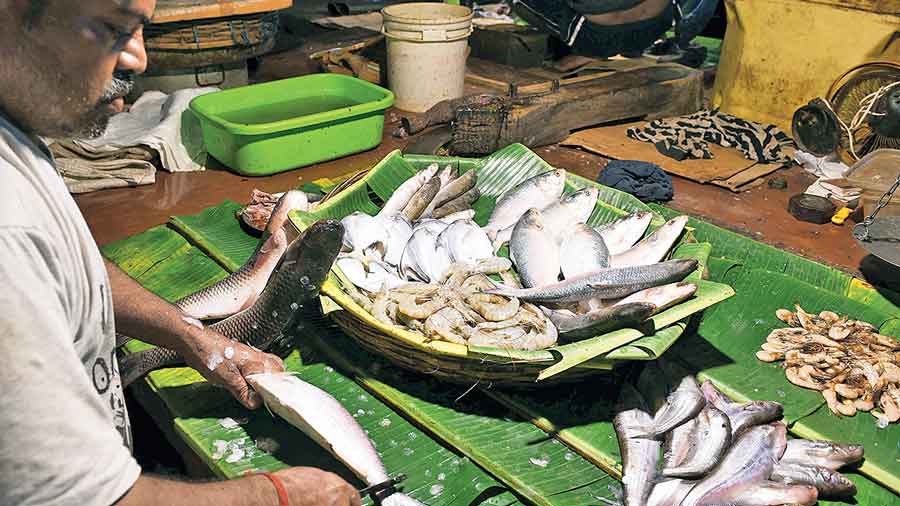Insufficient supply of fish at a time the monsoon has yet to attain its full strength has pushed up prices of many varieties across the city’s markets.
Hilsa, the top draw in Kolkata’s markets now, has been selling at nearly Rs 1,800 a kilogram at Lake Market in the south for the last few days. Bekti, a year-long favourite in the city, has been selling at Rs 600 a kilogram at the Park Circus market for more than a week.
Pomfret, another variety in demand throughout the year, sold at Rs 900 a kilogram at Jadavgarh market in Kasba on Sunday. Fish-sellers and fishery economics experts said the reason behind the spike was a mismatch between demand and supply. Fish prices spike every year around this time.
They said that around the beginning of the monsoon, hilsa is not abundant and other fishes mostly come from cold storage. The cost of keeping fish in cold storage results in a spike in retail prices.
Hilsa has become available in the market only recently and it is still not abundant in supply, a reason why the price is very high, said Somen Sahu, a professor of fishery economics. Pomfret is also scarce because fishermen focus more on catching hilsa than pomfret around this time of the year.

“Most people in retail markets are now asking for hilsa because it’s a monsoon delicacy. So fishermen, too, prefer to catch hilsa than pomfret around this time. The mesh size of the nets fishermen use around this time is ideal for hilsa,” said Sahu, who heads the fishery economics and statistics department at the West Bengal University of Animal and Fishery Sciences.
Sahu, also the marine adviser to the state fisheries department, said most of the pomfret that is available in markets are coming from cold storage. Traders have to recover the cost of storing the fish in warehouses for months, and they have no option but to raise the price. Even the prices of the staple varieties such as rohu and katla have increased. Raju Das, a fish seller at Lake Market, said the price of katla had increased to Rs 350 a kg from Rs 250 a kg a month ago.
Amar Das, another fish seller at the same market, said the price of bekti had gone up to Rs 600 a kg from Rs 450-500 a kg about two months back.
“This is the time when fish from the last harvest is being sold after bringing them from cold storage. The fresh harvest is scheduled around September. Prices will stabilise once the fresh harvest reaches the market,” said Amar. At the Park Circus market, too, betki has been selling at Rs 600 a kilo for a few weeks. Sahu said the price of rohu and katla has shot up because most of the bheris (where fish is cultivated) are now engaged in growing a kind of shrimp that has a high demand in the export market and earns good money for the cultivators. Sahu also pointed out that the price of fish varied between markets.
“Prices are relatively low in markets where most of the customers are from lower economic strata. In affluent areas, things are costlier,” he said.
